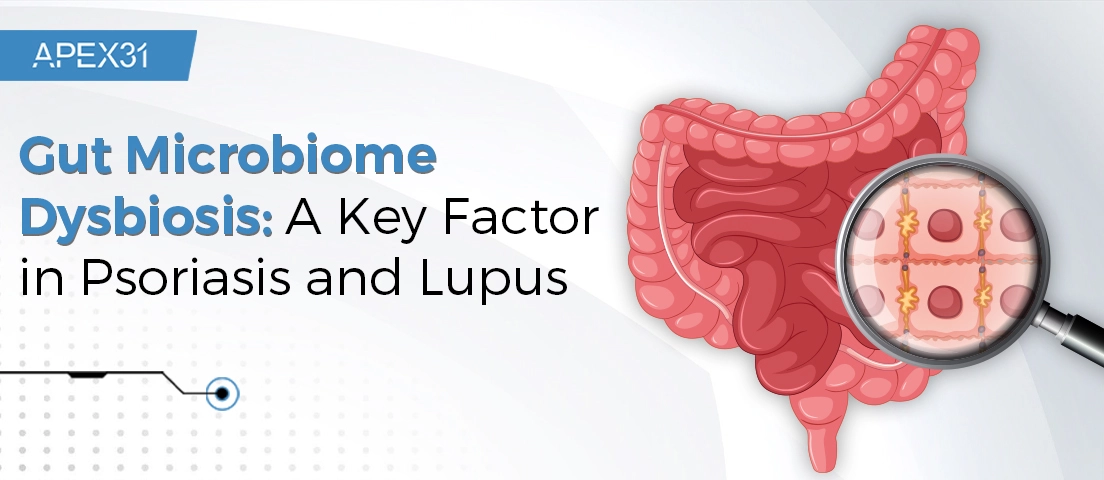Gut Microbiome Dysbiosis: A Key Factor in Psoriasis and Lupus

Our gut is home to trillions of microorganisms that together make up the gut microbiome. Did you know they don’t just help us digest the food but also play an instrumental role in regulating our immune system? But when there is a slight change in our git microbiome, it can impose a huge impact on our health, in the form of chronic autoimmune disorders. These are really hard to cure, not because of anything because their origin of cause remains elusive. This is what makes treatments for such disorders so challenging.
Most autoimmune disorders are closely linked to an imbalance in the gut microbiome, often called gut dysbiosis. When the balance of good and bad bacteria in our gut is disrupted, it can confuse the immune system and cause it to attack healthy tissues. This can lead to the development of autoimmune disorders. In this blog post, we will specifically discuss two chronic autoimmune diseases associated with gut dysbiosis: lupus and psoriasis.
What Is The Gut Microbiome?
The gut microbiome consists of microorganisms that live in our digestive tracts. They play a crucial role in maintaining our health. These microorganisms support vital body functions such as digestion, protein synthesis, immune system maintenance, and nutrient absorption.
What Happens During Gut Dysbiosis (Microbial Imbalance)
Our immune system relies on signals released by our gut microbiome. This is how the immune system learns to recognize and attack infections. However, when the healthy balance of the microbiome is disrupted, our immune system becomes confused and may start attacking our own body tissues, leading to inflammation. This condition can give rise to chronic diseases and autoimmune disorders such as lupus and psoriasis. Both disorders are inflammatory responses caused by microbial imbalance. Numerous studies support this theory.
How Gut Imbalance May Trigger Or Worsen Autoimmune Responses
Gut dysbiosis refers to changes in the number and types of microorganisms in the gut. When this imbalance occurs, it can weaken the gut lining and make it more permeable. This gives rise to a condition known as “leaky gut.” If you suffer from a chronic condition, you may have already heard of this term. When the gut becomes weak and permeable, substances from the digestive tract can pass into the bloodstream, triggering widespread inflammation. In response, the immune system begins to react to these foreign substances and may start attacking the body’s own tissues.
The Connection Between Gut Dysbiosis and Autoimmune Disorders
Autoimmune diseases like lupus and psoriasis are often connected to this gut imbalance. Dysbiosis can worsen immune system errors by promoting inflammation and disrupting normal immune regulation. This makes symptoms more severe and can even contribute to the initial development of these diseases.
- Lupus is an autoimmune disease where the immune system attacks multiple organs such as the skin, kidneys, and joints. An unhealthy gut microbiome can increase the body’s inflammatory response, potentially triggering lupus flare-ups.
- Psoriasis is a skin condition characterized by red, scaly patches caused by the immune system’s attack on skin cells. Gut dysbiosis can increase inflammation, making psoriasis symptoms worse.
Treatments
Scientists are exploring new treatment options for conditions like Lupus and Psoriasis. They aim to target the gut microbiome and restore it to normal levels in the gut. There are several probiotics and prebiotics that can help you keep your gut healthy. These approaches have helped patients reduce inflammation to some level, if not entirely.
Doctors and dieticians suggest these tips to treat autoimmune disorders:
- Eat healthy and balanced meals. Prefer food items rich in fibre as they are good for gut health. Fermented foods are also known for encouraging the healthy bacteria in the digestive tract, so you can consider including them in your diet.
- Take probiotic supplements to restore a healthy balance of the microbiome.
- Managing stress, exercising regularly and getting optimum sleep also help a lot to deal with the inflammation.
Holistic Approach To Autoimmune Diseases
Managing autoimmune diseases like lupus and psoriasis takes more than just treating symptoms. It calls for a holistic approach. This means looking at the body as a whole and addressing the root causes rather than just going on the surface level. A holistic approach is focused not only on the medications but also changes in your diet, habits and lifestyle.
Our APEX31 Day program is all about helping you overcome the effects of Lupus and Psoriasis with a holistic approach, where we will help you develop a practical way to deal with your symptoms. We will prepare your immune system through proper nutrition, physical activity and reducing the exposure to toxins. By creating balance across different areas of health, we will be able to reduce the inflammation and improve the body’s ability to heal and regulate itself naturally. Want to know more about our program? Talk to our expert now!



